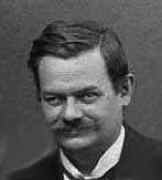Person: Fuchs (2), Richard

Richard Fuchs was a German mathematician who worked on differential equations and aerodynamics.
Mathematical Profile (Excerpt):
- Richard was born in Greifswald in north east Prussia (now in Germany), on the Baltic Sea.
- This means that Richard had lived in three different towns before he was two years old.
- It was in Heidelberg that Richard Fuchs began his schooling, attending a very good private school run by Antoni for eighteen months.
- This was an excellent school with around 500 pupils attracted from a wide area by its high reputation but, after a short time there, Richard Fuchs had to move on.
- In 1884 Lazarus Fuchs moved from Heidelberg to take up the Berlin chair left vacant by the death of Eduard Kummer so at this Richard Fuchs had to move school.
- When Fuchs studied at the school Ribbeck, a classical philologist, was still the headmaster with a staff of 15 teachers and over 500 pupils.
- Fuchs studied at this school for eight years and was inspired by the outstanding mathematics teacher Adolf Schumann who died in 1894, just a year after Fuchs graduated from the high school.
- In 1893 Fuchs took the maturity examination and entered the Friedrich-Wilhelm University of Berlin.
- He studied mathematics and physics there for eight semesters attending lectures by Fischer, Georg Frobenius, Lazarus Fuchs, Friedrich Robert Helmert (1843-1917), Hermann von Helmholtz, Kurt Hensel, Georg Hettner (1854-1914), Johannes Knoblauch (1855-1915), Eduard Eberhard Kundt (1839-1894), Friedrich Paulsen (1846-1908), Max Planck, Ernst Pringsheim, Ludwig Schlesinger, F E Schulze, Hermann Amandus Schwarz, and Carl Stumpf (1848-1936).
- We note that in addition to those who taught him mathematics and physics, Fuchs was also taught by the philosophers Paulsen and Stumpf, by F E Schulze who was Professor of Zoology, and by Helmert who was professor of advanced geodesy and director of the Geodetic Institute.
- Undertaking research advised by Hermann Amandus Schwarz and Georg Frobenius, Fuchs was awarded a doctorate from the Friedrich-Wilhelm University of Berlin in 1897 for his thesis Über die Periodicitätsmoduln der hyperelliptischen Integrale als Functionen eines Verzweigungspunktes.
- In 1901 Fuchs was appointed as a teacher at the Bismarck-Gymnasium in Berlin-Wilmersdorf.
- Returning to describe Fuchs' career, he habilitated at the Technische Hochschule Berlin-Charlottenburg in 1906 but continued to teach at the Bismarck-Gymnasium.
- Fuchs was sent to the German Research Institute for Aviation in Adlershof near Berlin.
- Fuchs contributed to the first of these two areas making studies of the mechanics of flight, in particular studying longitudinal and lateral stability of the aircraft and well as wing theory.
- In addition to his position at the Technische Hochschule Berlin-Charlottenburg, from 1922 to 1936 Fuchs also worked at the German Research Institute for Aviation in Berlin-Adlershof where he had carried out war work during the 1914-18 war.
- One of Fuchs' publications relating to his work at the Institute for Aviation was Berechnung der Luftkräfte in der Flugtechnik mittels der Theorie der Funktionen einer komplexen Veränderlichen Ⓣ(Calculation of air forces in aeronautical engineering by means of the theory of functions of a complex variable) (1928).
- Fuchs was a half-Jew so certainly came under the non-Aryan definition of the Civil Service Law but he had served in the 1914-18 war so came under the exemption clause.
Born 5 December 1873, Greifswald, Prussia now Germany. Died 28 December 1944, Bad Doberan, near Rostock, Germany.
View full biography at MacTutor
Tags relevant for this person:
Origin Germany
Thank you to the contributors under CC BY-SA 4.0! 

- Github:
-

- non-Github:
- @J-J-O'Connor
- @E-F-Robertson
References
Adapted from other CC BY-SA 4.0 Sources:
- O’Connor, John J; Robertson, Edmund F: MacTutor History of Mathematics Archive
